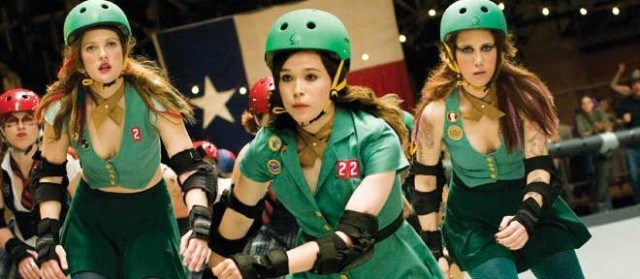The Cost of Being a Derby Girl
by Anne Carter

The first thing you need to know about me is that I play roller derby. I try to work roller derby into the first or second conversation I have with anyone, because the sooner you know I play derby, the sooner I can tell you how roller derby can change your life. The bumper stickers are all true: Roller derby saved my soul; it gave me friends and a community, and made a bookworm into an athlete, something not even the love of a good man had been able to do before. Picture the scene in She’s All That when Rachel Leigh Cook walks down the stairs in that red dress after her transformation, except instead of high heels, I clunk down the stairs in quad skates covered in skulls. Roller derby changed everything for me, even the way I think about money.
I’ve been skating a little longer than two years, and when I first started, I gave myself an unlimited budget for whatever I needed. I knew that I’d need to spend money on practices and gear, and I didn’t want to feel guilty about buying what I needed to be successful at this sport.
In our league, practice costs $10 per practice, which isn’t bad, but as soon as you buy gear, the numbers start adding up. I didn’t want to waste time on cheap skates that I’d have to replace when I got better, so I skated on rentals longer than I wanted and saved for good skates. I skate on Riedell Wicked 265 boots, Revenge plates, and RollerBones Koi 92a wheels. Altogether, I paid more than $500 for my skates, the most I’ve ever paid for “shoes,” and they are worth every penny. Add in another hundred bucks or two for gear, some of which I’ve already started to replace (kneepads, helmet, toe stops, mouth guards) and another couple hundred for derby clothes (uniform, shirts for scrimmages, replaced tights) and I’ve probably spent close to $1,000 on gear for derby in the year and a half since I joined my league.
Unfortunately, my budget hasn’t stayed unlimited. In switching from working at a law office to working for a nonprofit — my preferred career — I’ve gone from full-time employment to part-time, which means that spending as much on derby as I do on groceries is pretty hard to justify. It’s tough too, when lately I’ve ended every month with less money than I had to start.
Derby is one of the most expensive, most rewarding luxuries I allow myself, but this isn’t the time for luxury. To counteract against watching the dollars drain from my account, this month I cut back on derby: I went to fewer practices, avoided going to away scrimmages, and carpooled to practice. I didn’t buy an amazing T-shirt, blue with skulls, that I would have worn every day for the rest of my life. I said no to beers after we won our last game and went home again, saving my money even when it hurt. I was pretty proud of myself as the month wrapped up, and was feeling pretty glorious, like I was about to coast into a win.
The feeling dissipated after I was hit with a $98.47-punch to the stomach, the kind of brutal hit that knocks the wind out from you with an “OOOF!” That was my car insurance payment, automatically deducted from my account on the second to last day of the month, wiping out my small savings and sending me into the red by around sixty bucks.
Once, when I was a new skater, I jammed against one of the A-team players, Roller Rage Rosie, and managed to slip through the pack first and get the lead. As I skated into the straightaway, I felt awesome until Rosie hip-checked me into the ground and skated away to score points. It was a small motion, one I should have seen coming, but I ate track instead. Until now, I didn’t know that money could feel like that. Sixty bucks seems like a small number, but in derby, all it takes is for one wheel to cross the line and you are out of bounds. The same is true in math. I went sixty dollars out of bounds this month because I didn’t see my insurance coming.
When I figured out I was short on the first of November, I was pissed. I was mad at myself for forgetting the payment and mad that I’d failed. “Why even bother?” I thought, “Why even try? I can’t live on this income! Why did I bother skipping beers? Why didn’t I buy that T-shirt? I was doomed to fail before I started!”
The stronger, better part of me — the derby player — gritted her teeth. Sixty dollars is less than one hundred, so it isn’t that bad. It’s close to success, and I can just cut sixty next month. I can find it somewhere in my budget — a way to escape a hip-check. I’m disappointed, yes — I’m horribly frustrated that I didn’t remember this, that I didn’t see this automatic payment coming in on the turn, but I’m mad too, and when I’m mad I won’t forget. I’ll know it’s coming next month, and I’ll be ready.
Anne Canter lives in San Diego.
Support The Billfold
The Billfold continues to exist thanks to support from our readers. Help us continue to do our work by making a monthly pledge on Patreon or a one-time-only contribution through PayPal.
Comments